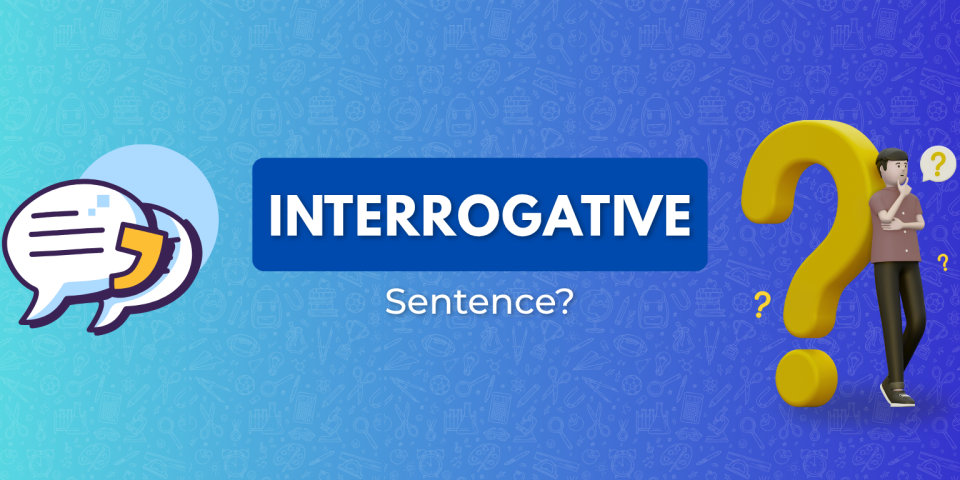Want to know how to ask questions clearly in English? Start by learning about interrogative sentences.
This guide will explain what an interrogative sentence is, its types, and how we use them every day.
If you are a student, teacher, or just want to improve your English, this guide is for you. Let’s explore the different ways we ask questions.
What is an Interrogative Sentence?
An interrogative sentence is a sentence that asks a question. It ends with a question mark (?) and helps you gain information or check something.
Example:
- Are you coming to school today?
- What time is it?
“Get success in exams with our 1-on-1 or group english tutoring sessions.”
Types of Interrogative Sentences
There are different types of interrogative sentences. Each has its own style and use.
1. Yes/No Questions
These questions can be answered with a yes or no.
Structure:
Auxiliary Verb + Subject + Main Verb + ?
Examples:
- Do you like pizza?
- Is she at home?
2. Wh- Questions
These begin with Wh- words like what, where, when, who, why, or how. They ask for specific details.
Examples:
- What is your name?
- Where do you live?
3. Choice Questions
These give options to choose from.
Structure:
Question + Option A + or + Option B + ?
Examples:
- Do you want tea or coffee?
- Should we go to the park or stay home?
4. Tag Questions
Tag questions turn a statement into a question by adding a short phrase at the end.
Structure:
Statement + comma + tag?
Examples:
- It’s raining, isn’t it?
- You’re tired, aren’t you?
5. Alternative Questions
These offer more than two choices, not just a yes or no.
Examples:
- Do you want juice, milk, or water?
- Should we watch a movie, play a game, or go outside?
“Book a free assessment for english tutors.“
Uses of Interrogative Sentences
Interrogative sentences are used in many parts of life. Let’s look at some real examples.
1. Conversations
We use questions in daily talk to keep the conversation going.
- What did you eat for lunch?
- How are you feeling?
2. Interviews
Interviewers use interrogative sentences to collect answers from job seekers or guests.
- Can you tell us about yourself?
- Why do you want this job?
3. Surveys and Research
These sentences help collect public opinions and data.
- How often do you travel?
- What is your favorite color?
4. Teaching and Learning
Teachers use questions to test knowledge or start discussions.
- What is the capital of France?
- Can you explain photosynthesis?
Sentence Structure of Interrogative Sentences
Here are common structures for interrogative sentences:
- Yes/No: Verb + Subject + Object?
- Wh-: Wh-word + Auxiliary + Subject + Verb?
- Choice: Verb + Subject + Option 1 or Option 2?
Examples of Interrogative Sentences in Real Life
Here are more sample questions used in different places:
- In school: Did you finish your homework?
- At home: What are we having for dinner?
- In public: Where is the nearest bus stop?
Quick Tips to Use Interrogative Sentences
- Start with a question word or a helping verb
- Always end with a question mark (?)
- Use the correct word order
- Keep your questions short and clear
Conclusion
Mastering the interrogative sentence helps you speak and write better. You can ask the right questions at the right time, in the right way. Whether you’re in school, at work, or with friends—good questions make communication stronger.
Read More What is a Declarative Sentence? Types and Uses with Examples
FAQs
Q1. What is an interrogative sentence in simple words?
It is a sentence that asks a question and ends with a question mark.
Q2. How many types of interrogative sentences are there?
There are five main types: yes/no, Wh- questions, choice, tag, and alternative.
Q3. Can interrogative sentences be used in writing?
Yes. They are used in essays, emails, surveys, and more.
Q4. Do interrogative sentences always need a question word?
No. Yes/no questions do not use question words.
Q5. What is the difference between declarative and interrogative sentences?
Declarative sentences give information. Interrogative sentences ask for information.


